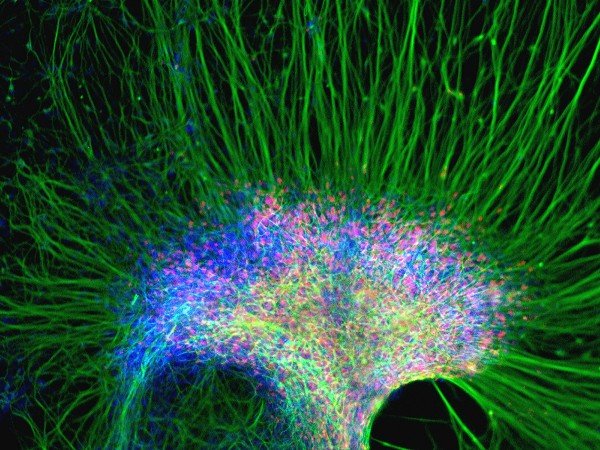
I Think, Therefore I Am (a Self-aware, Superhuman Cyborg)
Mel Exon
03/10/2009
This post exists to house the material we digested to write the “The Coming Age of Augmentation” Labs post which follows this one.
We have to come clean first. Yes, we do like tech innovation and even sci-fi. We count amongst our Labs midst a few fans of Philip K Dick and one who still reads Yevgeny Zamyatin, so we may appear to be on less than entirely rational, objective ground here. Then there is the fact there is something fabulously seductive about the language and imagery used to describe prospective real & imagined scientific frontiers: Dystopia, Utopia, Rapture (of the Nerds), the Singularity, that extraordinarily gripping, nightmare sequence in Terminator 2 when the playground is blown to smithereens… But we’re drifting from the point.
Here we’d like to create a virtual library of all the very best content about the Technological Singularity and related topics. Please add links to other good stuff worth reading in the comments. We’ve arranged the content here on a make-shift scale from Tech Evangelist all the way to Sceptic, starting with the former. Here goes -
THE TECH EVANGELIST VIEW
How the Technological Singularity may come about is best explained by the father of the term himself, Vernor Vinge, in his fantastically dystopian-utopian 1993 paper. The key passage in this respect is as follows:
“There are several means by which science may achieve this breakthrough (and this is another reason for having confidence that the event will occur):
* There may be developed computers that are “awake” and superhumanly intelligent. (To date, there has been much controversy as to whether we can create human equivalence in a machine. But if the answer is “yes, we can”, then there is little doubt that beings more intelligent can be constructed shortly thereafter.)
* Large computer networks (and their associated users) may “wake up” as a superhumanly intelligent entity.
* Computer/human interfaces may become so intimate that users may reasonably be considered superhumanly intelligent.
* Biological science may provide means to improve natural human intellect.”
There are more and more examples - as the journalist and author John Markoff has taken considerable time to explore here and here - that companies from tech start-ups to Google (see below) & Sony are taking this stuff seriously.
In a more alarming twist, we are also seeing students seeking to augment their intelligence with neuro-enhancing drugs like Adderall.
A long term pattern of paradigm shifting events modelled by Kurzweil suggests an exponential trend:
Kevin Kelly’s ongoing (extremely thought-provoking, brilliant and chewy in equal measure) project, The Technium, also delves deeply into a future where he sees technology driving evolution and the creation of a superorganism born of the world’s networked computers:
“As even people who don’t believe in evolution will tell you, if you speed up the history of life and compress all its change into a few hours, it greatly resembles an intelligent mind at work. Since technology is the current major vehicle for the evolvability of evolution, the future of technology also begins to resemble a mind. Or to put it another way, the mindful aspects of technology begin to dominate.”
Although he explains why he finds the term ‘Singularity’ misleading, he includes it in a post in July 2009 as one of ‘five unstoppables reigning in popular imagination right now‘.
Faris riffs on collective intelligence and the semantic web back in March 2007 and discusses how ‘people and technology are blurring in both directions‘ in August 2009.
And Google certainly seem clear that harnessing collective intelligence on an unprecedented scale is core to their strategy for growth:
“If there’s anything Google seeks to solve, he [Brin] explains in the restaurant, it’s the vastly ambitious challenges that others dismiss as irresoluble. “I feel like we have an obligation [to tackle the big problems],” Brin says. “There are not that many companies with the technical resources we have that would tackle these things. When there are challenges that are viewed as impossible, those are areas that we have almost an obligation to pursue.”
David Rowan on Sergey Brin, Wired interview, August 2009
“I like the emergence of - the marketing buzzword is ‘collective intelligence’, the emergence of the sum of what Facebook, Twitter, Google, the blogging sphere, what is really the beginning of a much deeper understanding of what’s really going on in the world. And I find it fascinating that this is what’s happening now, and Google is in a position to find it, sort it, rank it, organise it in a way that people who are busy can take advantage of. That’s how we see our customers go forward. And there’s a lot coming.”
“… it’s the model where the sum of what Google does becomes the third part of your brain - you know, there’s a left brain, a right brain and there’s a third part where that collective intelligence that Google can help bring to you really helps you get through every day: the history of places, what you should do, collecting things for you, telling you what’s relevant - the things that computers do best that humans are not good at. And that will leave humans to spend more time doing what humans do best, the things computers are not very good at.”
Eric Schmidt, Wired interview, August 2009
THE ‘INBETWEEN’ VIEW
“At the present rate of progress, it is almost impossible to imagine any technical feat that cannot be achieved - if it can be achieved at all - within the next few hundred years.”
Arthur C. Clarke, 1983
Jamais Cascio also writes eloquently for Fast Company about the Technological Singularity and for the Atlantic magazine about mankind’s need to ‘Get Smarter‘.
We also liked the honesty of Kevin Kelly in his response to a comment on his blog:
THE NEO LUDDITE VIEW
For the neo-Luddites: re-watch the deeply reassuring Johnnie Walker ad, ‘Android’.
In a mind-blowing and brilliant article for Wired nearly ten years ago in 2000, Bill Joy of Sun Microsystems certainly thought there was major cause for concern. His very personal and powerful piece argues very simply that we cannot anticipate what a super intelligent being might engineer and that we may not survive the encounter.
“Given the incredible power of these new technologies, shouldn’t we be asking how we can best coexist with them? And if our own extinction is a likely, or even possible, outcome of our technological development, shouldn’t we proceed with great caution?
The dream of robotics is, first, that intelligent machines can do our work for us, allowing us lives of leisure, restoring us to Eden. Yet in his history of such ideas, Darwin Among the Machines, George Dyson warns: “In the game of life and evolution there are three players at the table: human beings, nature, and machines. I am firmly on the side of nature. But nature, I suspect, is on the side of the machines.”
And goes on to say:
“A second dream of robotics is that we will gradually replace ourselves with our robotic technology, achieving near immortality by downloading our consciousnesses…But if we are downloaded into our technology, what are the chances that we will thereafter be ourselves or even human? It seems to me far more likely that a robotic existence would not be like a human one in any sense that we understand, that the robots would in no sense be our children, that on this path our humanity may well be lost.”
THE SCEPTIC VIEW
Doubt around the likelihood of the Singularity taking place tends to be two-fold:
1. The unlikelihood of a super-human intelligence being created successfully
“Our understanding of language and our ability to reason and think is in part a product of our ability to interact with the world around us and experience the world through our senses. Even if computers had the same experience, I don’t think they would be able to develop the same sort of connections we can make.”
Vint Cerf in Wired
2. The fear that, without a built-in human sensibility, a super intelligent software intelligence will wipe us off the planet and hence further major tech advancement will be halted to prevent this happening. At its (criminally insane) extreme, the infamous Unabomber’s point of view - reviewed here by Kevin Kelly.
THE ALTERNATE SCENARIOS
Vernor Vinge plots alternative scenarios with his 2007 piece ‘What if the Singularity does NOT happen?‘
FURTHER READING
The Coming Age of Augmentation - BBH Labs related post
Singularity Summit 2009 reading list
Cyburbia, by James Harkin - Cyburbia.tv
New Statesman, science fiction classics: ten of the best
***
A thank you to Faris Yakob whose shared fascination with AI has inspired us and to Adam Glickman for the same, in particular for directing us to the second John Markoff & Sony articles cited above and for his own Labs post here.



